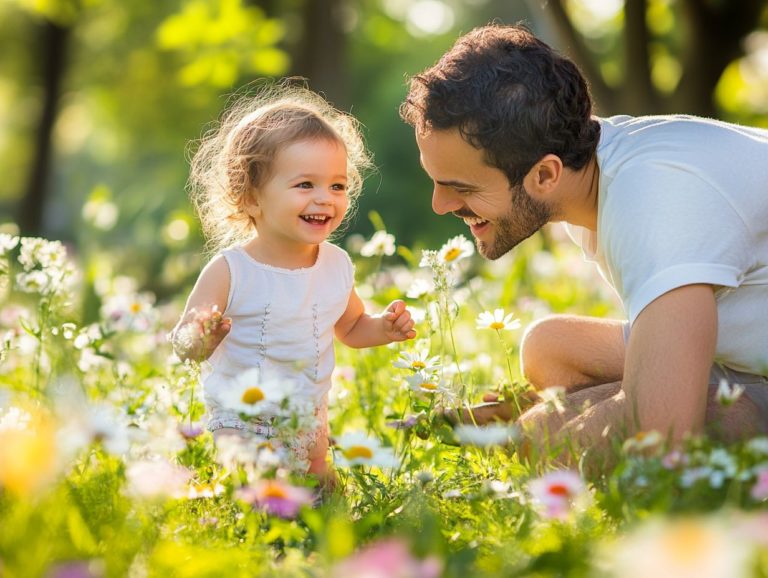5 Tools to Improve Parental Mindfulness
Contents
- Enhancing Parental Mindfulness: 5 Powerful Tools
- Key Takeaways:
- 1. Meditation Apps
- 2. Mindful Breathing Techniques
- 3. Journaling
- 4. Mindful Parenting Courses
- 5. Setting Boundaries and Prioritizing Self-Care
- What Is Parental Mindfulness and Why Is It Important?
- How Can Mindful Breathing Techniques Help with Parental Mindfulness?
- What Are the Benefits of Journaling for Parental Mindfulness?
- Frequently Asked Questions
- What is parental mindfulness and why is it important?
- What are some benefits of practicing parental mindfulness?
- How can I incorporate mindfulness into my daily routine as a parent?
- What are some tools or techniques I can use to improve my parental mindfulness?
- How can parental mindfulness benefit my children?
- Is it ever too late to start practicing parental mindfulness?
Enhancing Parental Mindfulness: 5 Powerful Tools
In the whirlwind of parenting, it s all too easy to lose touch with the present moment. By cultivating mindfulness, you can transform your parenting experience, deepening your connection with your children while fostering a sense of calm amidst the chaos.
This article delves into five powerful tools designed to enhance your parental mindfulness, from meditation apps that effortlessly fit into your busy schedule to mindful breathing techniques that keep you anchored in the now. You ll discover how journaling, mindful parenting courses, and setting healthy boundaries can elevate your journey as a parent.
Explore these strategies for a more mindful approach to raising your children, and see how they can enrich both your life and theirs.
Key Takeaways:

- Meditation apps can help parents practice mindfulness on-the-go and improve overall well-being.
- Mindful breathing techniques can reduce stress, increase focus, and enhance communication with children.
- Journaling can promote self-reflection, emotional regulation, and deeper connections with children.
1. Meditation Apps
Meditation apps have transformed the way you engage in mindfulness practices. They offer accessible tools that enhance your mental health and self-awareness, which are essential for nurturing both your children and yourself.
Developed by experts like Jenny from Mindfulmeschool, these applications feature a variety of mindfulness techniques that can easily fit into your daily routine. This makes it simpler for you to adopt a mindful approach to parenting.
Through guided meditations, breathing exercises, and reflective practices, these apps empower you to boost your emotional resilience and improve your overall well-being. One of the standout features of these meditation apps is the tailored content specifically designed for parents like you.
Many include sessions that focus on relaxation techniques perfect for unwinding after a long day helping you manage anxiety and stress levels effectively. You can also share these guided meditations with your children, creating a bonding experience that promotes positive emotional health for everyone involved.
By encouraging practices that enhance mental clarity, these tools not only support your personal growth but also instill mindfulness habits in your children, fostering a more nurturing and understanding family environment.
2. Mindful Breathing Techniques
Mindful breathing techniques serve as invaluable tools for you and your child, giving both of you the power to manage anxiety and stress while building emotional strength and calmness in your daily lives. By incorporating these practices, you can enhance your ability to calm yourself, which ultimately leads to a greater sense of mental clarity and well-being.
Making mindful breathing a part of your daily rituals establishes a shared practice within your family that promotes mindfulness and strengthens your emotional connections. Among the most effective techniques is deep breathing, where you take slow, deep breaths to soothe your nervous system.
The 4-7-8 method is another powerful approach; it involves inhaling for four seconds, holding for seven, and exhaling for eight, all designed to foster relaxation. Diaphragmatic breathing encourages full oxygen exchange by focusing on the diaphragm and can be particularly beneficial for children.
By teaching your children these calming methods, you equip them with essential skills to navigate daily stressors, enhancing their focus and attention both at school and at home. As you model these techniques, you not only alleviate your own anxiety but also cultivate a nurturing environment that supports your children’s mental health.
Discover these life-changing strategies now to enrich your parenting journey and transform your family dynamics!
3. Journaling
Journaling is an invaluable practice for you as a parent, enabling you to enhance your mindfulness. It offers a structured way to reflect on your thoughts and emotions while promoting emotional growth and gratitude. This practice fosters your self-awareness and provides a means to document your journey.
As you identify patterns in your behavior and emotions, you’ll likely notice improvements in your mental health and overall well-being. When you encourage your children to join in on journaling, you can cultivate a family culture rooted in reflection and open communication.
Exploring various techniques, like gratitude journaling, where both you and your children list things you re thankful for, can significantly uplift your mood and perspective. You can also try using reflection prompts, which offer valuable opportunities for deeper introspection, inviting you to consider your daily experiences and feelings more critically.
Expressive writing is another great option. It means writing freely to explore feelings and thoughts, helping to untangle complex emotions.
These practices enhance your emotional intelligence and foster empathetic interactions. They also strengthen your relationships by promoting clarity and understanding. As you and your children engage in these journaling techniques together, you create a shared space for vulnerability and support, ultimately enriching your family bond.
4. Mindful Parenting Courses

Mindful parenting courses are crafted to provide you with the essential tools to cultivate mindfulness in your daily interactions with your children. This approach nurtures healthy attachment, enhances effective communication, and fosters emotional resilience. Led by seasoned experts like Susan Kaiser Greenland, these courses offer profound insights into the principles of mindful parenting, encouraging you to adopt practices that promote well-being for both you and your children.
By weaving mindfulness techniques into your parenting style, your family can forge deeper connections and nurture emotional growth.
Throughout the curriculum, you will engage in comprehensive discussions on key topics. For example, limit setting highlights the significance of establishing boundaries in a nurturing manner. You will also explore healthy communication strategies that can transform your relationship with your children.
Get ready to engage in exciting activities like interactive activities, meditative practices, and group discussions. These provide you with opportunities to share experiences and learn from fellow parents. The outcome is a more supportive and empathetic family environment, where emotional challenges are met with understanding, fostering stronger family dynamics.
5. Setting Boundaries and Prioritizing Self-Care
Setting boundaries and prioritizing self-care are not just optional practices for you as a parent; they are essential for maintaining your mental health while cultivating a mindful approach to parenting. By establishing consistent limits for both yourself and your children, you create a stable environment that nurtures emotional growth and well-being. This conscious effort helps you manage stress and anxiety while promoting a sense of calm and happiness within your family.
Effective limit setting involves clear communication and consistent enforcement of rules, helping your children feel secure and understand expectations. You can employ techniques like positive reinforcement and natural consequences to support this process. Engaging in self-care rituals, whether it s mindfulness meditation or simple breathing exercises, allows you to recharge mentally and emotionally.
By weaving time for personal reflection and relaxation into your daily routine, you enhance your ability to respond to your children’s needs with patience and empathy, ultimately fostering a healthier family dynamic.
What Is Parental Mindfulness and Why Is It Important?
Parental mindfulness is all about being fully present in your parenting journey, allowing you to cultivate a deeper connection with your children while also nurturing your own mental health and well-being. This approach highlights the significance of mindfulness techniques that enhance emotional resilience, improve communication, and build trust within the parent-child relationship.
By embracing practices like mindful breathing or reflective listening, you can model emotional regulation and awareness for your children, setting the stage for healthier interactions. For example, dedicating just a few moments each day for mindful check-ins can give the power for your children to express their feelings effectively, fostering more empathetic responses from you.
Incorporating mindful play activities can turn routine tasks into meaningful bonding experiences, injecting joy and connection into your daily life. Ultimately, these exciting strategies strengthen family bonds and empower you and your children to tackle life’s challenges together!
How Can Mindfulness Help Parents?
Mindfulness can significantly enrich your parenting experience by equipping you with valuable tools to enhance your self-awareness, bolster your emotional resilience, and effectively manage stress throughout your journey. By embracing mindfulness, you gain a deeper understanding of your emotions and reactions, which fosters healthier communication with your children.
This heightened awareness not only helps you navigate the inevitable challenges of parenting but also cultivates a sense of calm and joy within your family dynamic, promoting positive emotions and gratefulness.
By actively weaving mindfulness practices into your daily routines like taking time for deep breathing exercises during those chaotic mornings or enjoying a mindful walk while engaging with your children you can create a more tranquil environment. Setting aside just a few minutes each day for meditation can yield significant improvements in your emotional regulation, giving you the power to respond thoughtfully instead of reacting impulsively.
You can even incorporate mindfulness rituals and visualization exercises for more profound effects. Even mindful cooking, where you savor flavors and textures, can become a delightful bonding activity with your kids, enhancing communication and connection.
These seemingly small yet profoundly impactful moments can transform your daily interactions into rich opportunities for growth and understanding. Such mindfulness rituals can also deepen your body awareness and overall consciousness.
What Are the Benefits of Using Meditation Apps for Parental Mindfulness?

Using meditation apps can help you engage both your upstairs brain and downstairs brain, balancing your logical and emotional responses effectively.
Using meditation apps for parental mindfulness offers you a multitude of benefits, granting easy access to guided practices that enhance your mental health and emotional resilience. These apps are brimming with mindful meditation techniques for parents expertly crafted for busy parents like you, enabling seamless integration of meditation into your daily routine.
By nurturing a regular meditation practice, you can cultivate a profound sense of calm, boost your self-awareness, and elevate your overall emotional well-being. Techniques addressing both the amygdala the part of the brain that controls emotions and overall brain function can be particularly beneficial.
Designed with your busy lifestyle in mind, many of these applications feature short, effective sessions that can effortlessly fit into even the most chaotic schedules. You have the freedom to select from a variety of themes such as stress relief, gratitude, or compassion that directly address your unique challenges.
Some apps also guide you through mindful hand reflexology, which can serve as a quick relaxation technique. Many of these apps also include progress tracking, motivating you to maintain consistent practice while showcasing your improvements in mood and focus.
Engaging in these mindfulness exercises not only supports your individual mental health but also positively influences your parenting style, fostering patience and emotional stability within your family dynamics. The mental health benefits can lead to more flow moments, where you and your family experience deep engagement and satisfaction.
Make meditation a priority today to transform your parenting journey instantly!
How Can Mindful Breathing Techniques Help with Parental Mindfulness?
Mindful breathing techniques are essential for enhancing your parental mindfulness. They offer you effective strategies to manage anxiety and stress while nurturing your self-soothing abilities.
By engaging in simple yet powerful breathing exercises, you can cultivate a profound sense of calm and presence. This allows you to respond more thoughtfully to your children’s needs. This practice not only enhances your mental health but also fosters a more supportive environment for your children. Techniques like these can positively influence your moods and overall development.
Incorporating a variety of breathing techniques into your daily routine can build resilience and improve emotional regulation. For instance, you might practice deep diaphragmatic breathing: inhale deeply through your nose, allowing your belly to expand, and then exhale slowly to release tension. This technique can be particularly helpful during stressful or frustrating moments.
Practicing these techniques leads to greater body awareness and contributes to better mental health outcomes.
The 4-7-8 technique, where you inhale for four seconds, hold for seven, and exhale for eight, can serve as a quick grounding tool that fits seamlessly into your day. By integrating these practices into everyday activities, such as before school pick-ups or while preparing meals, you can make them an organic part of your family life, enhancing emotional well-being for everyone involved.
Explore fantastic resources at Mindfulmeschool and the Institute of African American Mindfulness in Washington D.C. to kickstart your mindfulness journey today!
What Are the Benefits of Journaling for Parental Mindfulness?
Journaling can help you better understand different parts of your brain that control your thoughts and feelings. It aids you in recognizing where your thoughts and reactions originate.
Journaling presents you with significant benefits for cultivating parental mindfulness. It acts as a powerful tool for self-reflection and emotional growth while enhancing your self-awareness. By taking the time to document your thoughts and feelings, you can gain valuable clarity about your emotions and experiences. This leads to a deeper understanding of your parenting journey.
This practice encourages you to articulate your reflections, fostering a mindful approach to your daily interactions with your children. Experts like Susan Kaiser Greenland and researchers like Emmons and McCullough have highlighted the importance of such practices.
Exploring various forms of journaling, such as gratitude journaling and reflective writing, allows you to cultivate a more positive mindset. Gratitude journaling helps you recognize the small joys in everyday life, promoting an attitude of appreciation that can uplift the overall morale within your family.
Similarly, reflective writing provides a dedicated space for you to process both challenges and triumphs. It enhances your emotional intelligence by encouraging you to analyze your responses and decisions. Csikszentmihalyi’s concept of flow moments can also be documented to better understand your peak experiences.
Together, these journaling practices not only foster emotional resilience but also contribute to improved mental health outcomes. They nurture well-being for both you and your children. Start your journaling practice today to unlock new insights into your parenting journey!
How Can Mindful Parenting Courses Improve Parental Mindfulness?
Mindful parenting courses often include elements of hand reflexology and visualisation to enhance mindfulness practices.
Mindful parenting courses can significantly enhance your parental mindfulness by equipping you with essential skills and techniques to foster emotional resilience and cultivate healthy attachments in your relationships with your children. These courses offer structured guidance on effective communication and mindful practices that give the power to you to navigate parenting challenges with confidence. By engaging in these programs, you will deepen your understanding of mindfulness and enrich your overall parenting approach. For example, incorporating visualizations for mindful parenting can be particularly beneficial. The Institute of African American Mindfulness and experts like Susan Kaiser Greenland offer excellent resources for such courses.
Beyond communication skills, these courses delve into critical topics such as self-regulation, empathy building, and strategies for managing stress during parenting hurdles. You’ll learn to cultivate a more present and observant mindset, which often leads to reduced anxiety and improved emotional well-being for both you and your children. Such courses often emphasize the importance of body awareness and consciousness in mindfulness practices.
With time, this transformation can strengthen family bonds, nurture greater emotional intelligence in your children, and create a more supportive home environment. As you continue to practice mindfulness, you not only set a positive example for your children but also establish lasting habits that contribute to healthier family dynamics.
Frequently Asked Questions
What is parental mindfulness and why is it important?
Parental mindfulness is the practice of being fully present and aware in the present moment with your children. It involves paying attention to your thoughts, feelings, and actions as a parent, without judgment. It is important because it helps parents to be more responsive and attuned to their children’s needs, leading to better relationships and overall well-being for both parents and children.
What are some benefits of practicing parental mindfulness?
Some benefits of practicing parental mindfulness include reduced stress levels, improved relationships with children, increased self-awareness and self-regulation, and better communication skills. It can also help parents to be more patient, empathetic, and present with their children.
How can I incorporate mindfulness into my daily routine as a parent?
There are many ways to incorporate mindfulness into your daily routine as a parent. Some examples include starting the day with a mindful breathing exercise, taking a few minutes to be fully present during daily tasks like making breakfast or doing laundry, and practicing mindful listening when your child is talking to you. It can also be helpful to set aside dedicated time for mindfulness practice, such as through meditation or yoga.
What are some tools or techniques I can use to improve my parental mindfulness?
There are several tools and techniques that can help improve parental mindfulness. Some popular ones include meditation, yoga, journaling, mindful breathing exercises, and visualization. It can also be helpful to seek out mindfulness courses or workshops specifically geared towards parents.
How can parental mindfulness benefit my children?
When parents practice mindfulness, it can have positive effects on their children as well. Children often pick up on their parents’ emotions and energy, so when a parent is more calm, present, and attuned, it can lead to a more peaceful and harmonious household. Additionally, children can learn valuable skills such as self-awareness, self-regulation, and empathy from their mindful parents.
Is it ever too late to start practicing parental mindfulness?
No, it is never too late to start practicing parental mindfulness. While it is beneficial to start early on in your parenting journey, it is never too late to make a positive change and improve your relationship with your children. Mindfulness is a lifelong practice and can continue to benefit both parents and children at any stage in life. Mindfulmeschool, founded by Jenny, offers excellent resources for parents at any stage.







